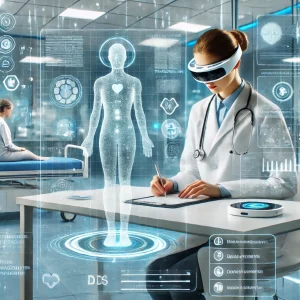
Medical note-taking has always been a cornerstone of effective healthcare, ensuring continuity of care and enabling informed decision-making. Yet, for decades, it has been a time-consuming and error-prone task, pulling healthcare professionals away from what matters most – their patients. With the rise of artificial intelligence (AI), this narrative is now changing dramatically.
The Challenges of Traditional Note-Taking
Anyone who’s worked in healthcare or implemented these systems knows the grind of documentation. It’s not just about writing things down, it’s about precision, compliance, and juggling multiple systems.
Here’s where some of the pain points are:
- Time Sink: Documentation can consume up to half of a healthcare provider’s day, stealing time that could be spent with patients.
- Error-Prone Processes: Manual data entry leaves room for mistakes, these mistakes that can have serious consequences.
- Burnout: The administrative burden contributes to exhaustion and decreased job satisfaction.
These aren’t new problems, but AI is stepping in to offer fresh, practical solutions.
The Early Challenges of Voice Recognition Technology
Voice recognition technology has been around for years, but for a long time, it wasn’t the seamless solution it promised to be. Healthcare professionals faced significant hurdles:
- Extensive Training: Earlier systems required practitioners to spend hours training the software to recognize their voice, tone, and accent. This steep learning curve often felt like more effort than it was worth.
- Inaccuracy: Even after training, many systems struggled with medical jargon, accents, or background noise, leading to frustration and poor adoption.
- Rigid Systems: Early tools often lacked adaptability, requiring users to stick to rigid commands or structures.
These challenges made voice recognition a tool that many were hesitant to adopt, despite its potential.
How Modern AI Solves These Issues
The AI behind today’s voice recognition tools is lightyears ahead of its predecessors. Here’s how it addresses the curve:
- Minimal Training: Advanced AI models now come pre-trained on vast datasets, including medical terminology, reducing the time practitioners need to invest in customization.
- Adaptability: Machine learning enables these tools to learn and adapt to individual voices over time, even picking up on accents, speech patterns, and specialized vocabulary.
- Noise Tolerance: Modern systems are designed to filter out background noise, making them effective in busy hospital environments.
- Real-Time Transcription: AI now offers real-time accuracy, meaning healthcare professionals can focus on their patients while the system captures everything seamlessly.
This shift means that voice recognition is no longer a chore, it’s a powerful ally.
How AI is Transforming Note-Taking
AI-powered tools go far beyond voice recognition. They’re rethinking the entire process of medical documentation:
- Smart Summaries: AI tools analyze conversations and extract key information, generating concise, actionable notes.
- Contextual Alerts: These systems can flag inconsistencies or missing details, helping to improve the quality of documentation.
- Seamless Integration: AI-driven tools integrate directly with electronic health records (EHRs), eliminating redundant data entry and improving workflow efficiency.
The Benefits for Healthcare Providers and Patients
This transformation isn’t just about efficiency, it’s about improving care.
For Providers:
- Less Admin Time: Automation reduces time spent on documentation, freeing up hours for patient interaction.
- Enhanced Accuracy: By reducing manual input, AI minimizes errors.
- Lower Stress Levels: Streamlined workflows alleviate the pressure of administrative tasks.
For Patients:
- More Attention: With less time spent on screens, providers can engage more deeply with patients.
- Better Outcomes: Accurate notes lead to informed diagnoses and treatments.
- Faster Care: Streamlined processes reduce delays.
Examples of AI Tools Leading the Way
AI in medical note-taking isn’t a distant dream, it’s here, and it’s effective. Tools like Suki AI, DeepScribe, and Nuance Dragon Medical One are transforming the industry by:
- Automatically transcribing conversations during consultations.
- Integrating notes directly into EHR systems.
- Reducing documentation time by up to 70%.
These tools are redefining what’s possible in healthcare.
Overcoming Barriers to Adoption
As promising as AI is, its adoption isn’t without challenges:
- Data Privacy: Ensuring compliance with regulations like HIPAA is critical to maintaining patient trust.
- Training and Buy-In: Staff need proper training to maximize the benefits of AI tools. Resistance to change can be a hurdle, but success stories are helping to turn the tide.
- Cost Concerns: Smaller practices may worry about affordability, though scalable solutions are becoming more common.
By addressing these challenges, healthcare organizations can unlock the full potential of AI.
A Look to the Future
The future of AI in medical note-taking is bright. As technology evolves, we can expect tools that:
- Predict patient needs based on historical data.
- Break language barriers with real-time multilingual transcription.
- Continuously learn and improve to meet the unique demands of every practice.
These advancements will shape a healthcare system where technology enhances human expertise, not replaces it.
AI is transforming medical note-taking from a frustrating task into a seamless process. By addressing the challenges of traditional methods, and even overcoming the pitfalls of earlier voice recognition technologies, AI is enabling healthcare professionals to focus on what they do best: caring for patients.
